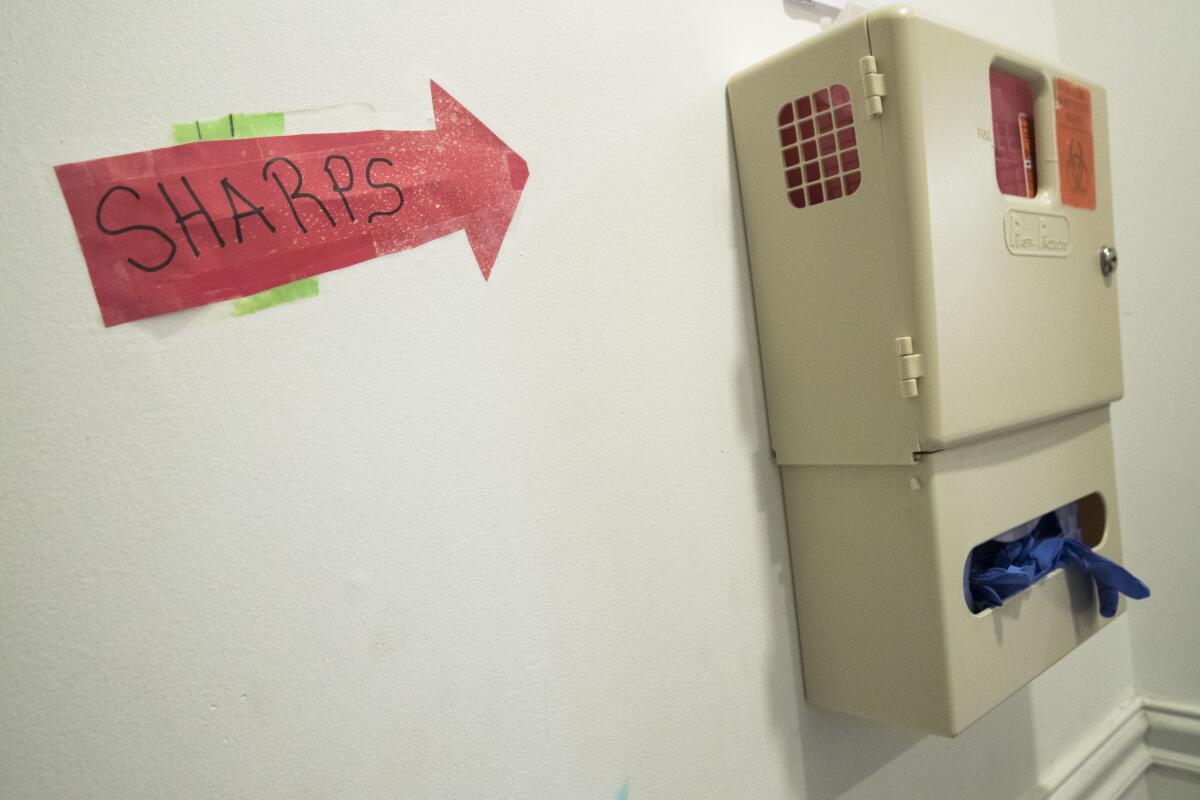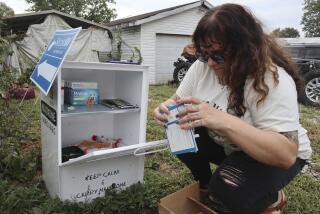New York City OKs safe sites for drug use, aiming to curb overdoses

- Share via
NEW YORK — The first authorized safe havens for people to use heroin and other narcotics have been cleared to open in New York City, in hopes of curbing deadly overdoses, officials said Tuesday.
The privately run “overdose prevention centers” are monitored places where drug users can partake. Also known as “supervised injection” or “safer consumption” sites, they are in use in Canada, Australia and Europe and have been discussed for years in New York and other U.S. cities and states. A few unofficial facilities have operated in New York for some time.
Proponents see the facilities as lifesaving tools for stopping overdoses, which are claiming record numbers of lives in the U.S. and its most populous city.
“I’m proud to show cities in this country that after decades of failure, a smarter approach is possible,” Mayor Bill de Blasio, a Democrat, said in a statement.
Opponents see the sites as moral failures that essentially sanction people harming themselves and create hubs of drug use. Further, federal law bans the operation of a place for taking illegal drugs; the government successfully sued in recent years to block a supervised consumption space in Philadelphia.
The U.S. Justice Department declined to comment Tuesday on New York City’s approach, which is allowing supervised injection sites at existing syringe exchange programs. City Health Commissioner Dr. Dave Chokshi said the sites were open as of Tuesday.
The sites don’t sell drugs — users bring their own — but have monitors who watch for signs of overdose and can administer an antidote if needed. Sterile syringes and other gear are usually on hand. Chokshi said the facilities also would offer referrals to drug treatment and other services.
Proponents say supervised consumption spaces can gently steer users toward treatment. But the primary aim is to keep them from overdosing.
“This place is about meeting people where they are and giving them the hours and the days and the support that they need to make choices for themselves,” said Kassandra Frederique of the Drug Policy Alliance, a group that advocates for less punitive drug laws.
Advocates and city officials also argue that the sites can curb drug use in public places.
The U.S. has been contending for years with a boom in opioid use and deaths, fueled in the 1990s by increased prescribing of newly available painkillers, then by heroin and illicit fentanyl. Nearly 500,000 people nationwide died of opioid overdoses from 1999 to 2019, according to the Centers for Disease Control and Prevention, and the epidemic worsened last year. The CDC estimates there were more than 93,300 overdose deaths in 2020, up nearly 30% from the year before. In New York City, more than 2,060 people died of overdoses last year, the most since reporting began in 2000.
Seeing such statistics, cities from San Francisco to the college town of Ithaca, N.Y., have sought to open supervised injection sites. In July, Rhode Island became the first state to authorize them. At the same time, communities in the Seattle area and elsewhere have moved to ban them or have discussed doing so.
Researchers have estimated that supervised injection sites in New York City could prevent 130 deaths and save $7 million in healthcare expenses per year. Studies have found that such facilities reduce HIV infections and 911 calls for overdoses, among other problems.
De Blasio, who is leaving office next month, first asked the state for permission to authorize such sites in 2018. At the time, city officials said they would need approval from the state Health Department and district attorneys in the areas of the sites, among other officials.
Some of New York City’s five district attorneys, including those in Manhattan, Brooklyn and Queens, are open to safe injection sites. Queens Dist. Atty. Melinda Katz “believes we must explore all viable public health and safety strategies to save lives and connect drug users to treatment, medical care and critical social services,” spokesperson Chris Policano said.
But Staten Island Dist. Atty. Michael McMahon has opposed the facilities, saying they amount to government encouragement of illegal drug use.
“I believe creating supervised injection sites undermines prevention and treatment efforts, and only serves to normalize use of these deadly drugs,” McMahon, a Democrat like the other four elected district attorneys, said in a 2018 statement that his office offered as a response to Tuesday’s announcement. “There are better ways to accomplish our shared goal of saving lives.”
Bridget Brennan, the city’s special narcotics prosecutor, also has expressed reservations, saying the facilities could create legal problems, neighborhood tension and a misimpression that drug use is safe.
After Tuesday’s announcement, Brennan called on the city to measure the facilities’ effectiveness — at both reducing overdoses and getting people into treatment — and get input from police and community members.
The New York Police Department said it had been consulted about the city’s authorization of injection sites but did not comment further.
The announcement came less than two months after the U.S. Supreme Court declined to take up a Philadelphia group’s fight to open a safe injection site, which a divided federal appeals court had rejected. Federal prosecutors in Philadelphia had sued to stop the plan, citing a 1980s law aimed at shuttering locations where people used crack cocaine.
More to Read
Sign up for Essential California
The most important California stories and recommendations in your inbox every morning.
You may occasionally receive promotional content from the Los Angeles Times.










